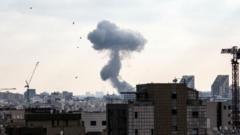*The U.S. finds itself at a contentious crossroads as President Trump's unilateral military action against Iran raises alarm among lawmakers and civilians alike.*
**Escalation in U.S.-Iran Relations: A Controversial Military Strike**

**Escalation in U.S.-Iran Relations: A Controversial Military Strike**
*President Trump acts without Congress approval, triggering a national debate about executive power and legality.*
June 22, 2025, 6:40 p.m. ET
In a dramatic escalation of tensions, President Trump has conducted airstrikes targeting Iran's nuclear facilities without prior approval from Congress, igniting a storm of criticism from a divided political landscape. Many argue that this action, which the U.S. Constitution reserves for Congress, effectively constitutes an unauthorized declaration of war.
Members of the Democratic Party, alongside some Republicans, express grave concerns over the implications of such a significantmilitary engagement. Critics have cited Trump’s decision as illegal, claiming that it circumvents established frameworks meant to limit presidential war powers in light of previous conflicts in the Middle East.
Despite the backlash, some within the administration defend the strikes. Secretary of State Marco Rubio asserted that the military action is a focused effort designed to mitigate Iran's threatening nuclear ambitions, not a war against Iran. Vice President JD Vance echoed this sentiment, attributing to Trump "the authority to act decisively to counteract the threat of weapons of mass destruction."
Yet, Trump himself raised eyebrows on social media when he suggested a broader military agenda: "If the current Iranian Regime is unable to MAKE IRAN GREAT AGAIN, why wouldn’t there be a Regime change??? MIGA!!!" His remarks allude to a potentially expansive military strategy that could embroil the United States deeper into conflict, a point of concern as geopolitical tensions remain high.
The swift nature of this military response comes in the wake of Israel's recent aerial campaigns against Iran, signifying a shift in the stability of international relations within this volatile region. The urgent need for dialogue and deliberation around U.S. military intervention calls to mind ongoing bipartisan discussions aimed at reclaiming legislative authority over war decisions. If further hostilities ensue, experts warn it may evolve into an all-out conflict, intensifying an already precarious situation.
In a dramatic escalation of tensions, President Trump has conducted airstrikes targeting Iran's nuclear facilities without prior approval from Congress, igniting a storm of criticism from a divided political landscape. Many argue that this action, which the U.S. Constitution reserves for Congress, effectively constitutes an unauthorized declaration of war.
Members of the Democratic Party, alongside some Republicans, express grave concerns over the implications of such a significantmilitary engagement. Critics have cited Trump’s decision as illegal, claiming that it circumvents established frameworks meant to limit presidential war powers in light of previous conflicts in the Middle East.
Despite the backlash, some within the administration defend the strikes. Secretary of State Marco Rubio asserted that the military action is a focused effort designed to mitigate Iran's threatening nuclear ambitions, not a war against Iran. Vice President JD Vance echoed this sentiment, attributing to Trump "the authority to act decisively to counteract the threat of weapons of mass destruction."
Yet, Trump himself raised eyebrows on social media when he suggested a broader military agenda: "If the current Iranian Regime is unable to MAKE IRAN GREAT AGAIN, why wouldn’t there be a Regime change??? MIGA!!!" His remarks allude to a potentially expansive military strategy that could embroil the United States deeper into conflict, a point of concern as geopolitical tensions remain high.
The swift nature of this military response comes in the wake of Israel's recent aerial campaigns against Iran, signifying a shift in the stability of international relations within this volatile region. The urgent need for dialogue and deliberation around U.S. military intervention calls to mind ongoing bipartisan discussions aimed at reclaiming legislative authority over war decisions. If further hostilities ensue, experts warn it may evolve into an all-out conflict, intensifying an already precarious situation.






















